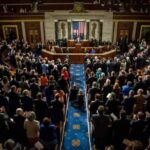What began as a protest by Canadian truckers over Covid-19 restrictions has evolved into a possible spark for cryptocurrency policy reform in the United States.
Protests in Canada’s capital were stifled by Prime Minister Justin Trudeau’s decision to freeze the bank accounts and crypto assets of the leaders of the Freedom Convoy 2022.
Aside from bringing down the Freedom Convoy, the clampdown also triggered fresh attempts by Republicans in Washington to keep the government out of people’s crypto wallets. Thus to avoid a similar government crackdown in the United States, at least one Republican House member has introduced a bill, according to a report by Politico.
Republican lawmakers and proponents of digital assets are using the Ottawa incident to argue that digital assets are an instrument for civil freedoms since they are not subject to the control of any government entity.
Republican Senator of Texas Ted Cruz said:
“There is a reason these petty authoritarians around the world hate Bitcoin and crypto: They can’t control it. The playbook of the modern radical left is that if you don’t comply, they’re willing to destroy your reputation and your personal finances.”
Fundraisers turn to Bitcoin
Following the removal of the fundraising page for the Freedom Convoy from the GoFundMe site, supporters rushed to another initiative spearheaded by Bitcoin advocates to gather funds for the convoy.
In less than a day after launching on the crowdsourcing portal Tallycoin, the new campaign raised more than $1 million in Bitcoin to pay truckers’ food, lodging, and other basic requirements as the protest entered its third week of operation.
In an attempt to stop the circulation of funds a total of 34 cryptocurrency wallets allegedly associated with the Canadian truckers were blocked as the Royal Canadian Mounted Police (RCMP) Canada’s national police force has issued an order requiring all FINTRAC-regulated organizations in Canada to stop interacting with the wallets.
However, the frozen Bitcoin tied to Canadian truckers went on the move, defying the authorities’ orders to freeze the funds it is still unclear if the assets were cashed out for fiat or remain locked on those crypto trading platforms.
In the end, it is possible to draw a more general conclusion from this event, which emphasizes the limitations of a government’s power to obstruct transactions on decentralized platforms, as well as the limitations of such systems’ ability to circumvent such sanctions.








